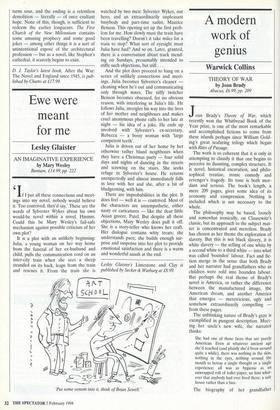Ewe were meant for me
Lesley Glaister
AN IMAGINATIVE EXPERIENCE by Mary Wesley Bantam, £14.99, pp. 222 If I put all these connections and meet- ings into my novel, nobody would believe it. Too contrived, they'd say.' These are the words of Sylvester Wykes about his own would-be novel within a novel. Hmmm. Could this be Mary Wesley's fail-safe mechanism against possible criticism of her own plot?
It is a plot with an unlikely beginning: Julia, a young woman on her way home from the funeral of her ex-husband and child, pulls the communication cord on an inter-city train when she sees a sheep stranded on its back, leaps from the train and rescues it. From the train she is
watched by two men: Sylvester Wykes, our hero, and an extraordinarily unpleasant busybody and part-time sadist, Maurice Benson. This opening set up the first prob- lem for me. How slowly must the train have been travelling? Doesn't it take miles for a train to stop? What sort of eyesight must Julia have had? And so on. Later, granted, there is a conversation about track mend- ing on Sundays, presumably intended to stifle such objections, but still . . .
And the plot does proceed to hang on a series of unlikely connections and meet- ings. Julia becomes Sylvester's cleaner cleaning when he's out and communicating only through notes. The niffy twitcher Benson becomes obsessed, for no obvious reason, with interfering in Julia's life. He follows Julia, inveigles his way into the lives of her mother and neighbours and makes cruel anonymous phone calls to her late at night — his idea of a joke. He ends up involved with Sylvester's ex-secretary, Rebecca — a bossy woman with 'large competent teeth'.
Julia is driven out of her home by her otherwise rather bland neighbours when they have a Christmas party — four solid days and nights of dancing in the streets and screwing on the stairs. She seeks refuge in Sylvester's house. He returns unexpectedly and almost immediately falls in love with her and she, after a bit of bludgeoning, with him.
There are improbabilities in the plot. It does feel — well it is — contrived. Most of the characters are unsympathetic, either nasty or caricatures — like the dear little Asian grocer, Patel. But despite all these objections, Mary Wesley does pull it off. She is a story-teller who knows her craft. Her dialogue contains witty treats; she understands pace; she builds enough sur- prise and suspense into her plot to provide emotional satisfaction and there is a warm and wonderful aaaah at the end.
Lesley Glaister's Limestone and Clay is published by Secker & Warburg at £8.99.
Put some venom into it, think of Brian Sewell.'


















































 Previous page
Previous page